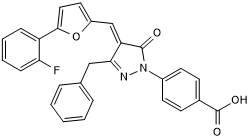| Description |
GS143 is a selective IκBα ubiquitination inhibitor with an IC50 of 5.2 μM for SCFβTrCP1-mediated IκBα ubiquitylation. GS143 suppresses NF-κB activation and transcription of target genes and does not inhibit proteasome activity. GS143 has anti-asthma effect[1][2].
|
| Related Catalog |
|
| Target |
IC50: 5.2 μM (SCFβTrCP1-mediated IκBα ubiquitylation)[2]
|
| In Vitro |
GS143 (10 μM or 20 μM) inhibits antigen-induced differentiation of Th2 cells but not of Th1 cells in vitro. The IL-4 production in Th2-polarizing condition is markedly suppressed by GS143 in a dose-dependent manner[1]. GS143 suppresses the transcription of TNFα-induced NF-κB with a mean IC50 value of 10.5 μM. GS143 also inhibits TNFα-induced expression of ICAM-1 in HT-29 colon cancer cells with an IC50 value of 6.1 μM. The production levels of TNFα and IL-1β in LPS-activated THP-1 cells are inhibited with IC50 values of 5.3 μM and 2.1 μM, respectively. GS143 does not inhibit p53 and β-catenin[2].
|
| In Vivo |
GS143 (16-32 μg/body; intranasal administration; once; BALB/c mice) treatment suppresses antigen-induced NF-κB activation in the lung of sensitized mice. GS143 treatment also inhibits antigen-induced eosinophil and lymphocyte recruitment into the airways and the expression of Th2 cytokines and eotaxin in the airways[1]. Animal Model: BALB/c mice (age 7-8weeks) injected with ovalbumin[1] Dosage: 16 μg/body or 32 μg/body Administration: Intranasal administration; once Result: Suppressed antigen-induced NF-κB activation in the lung of sensitized mice.
|
| References |
[1]. Koichi Hirose, et al. GS143, an IkappaB ubiquitination inhibitor, inhibits allergic airway inflammation in mice. Biochem Biophys Res Commun. 2008 Sep 26;374(3):507-11. [2]. Hiroto Nakajima, et al. A novel small-molecule inhibitor of NF-kappaB signaling. Biochem Biophys Res Commun. 2008 Apr 18;368(4):1007-13.
|
